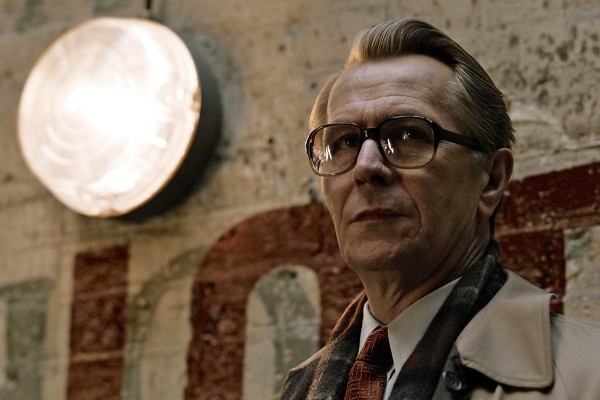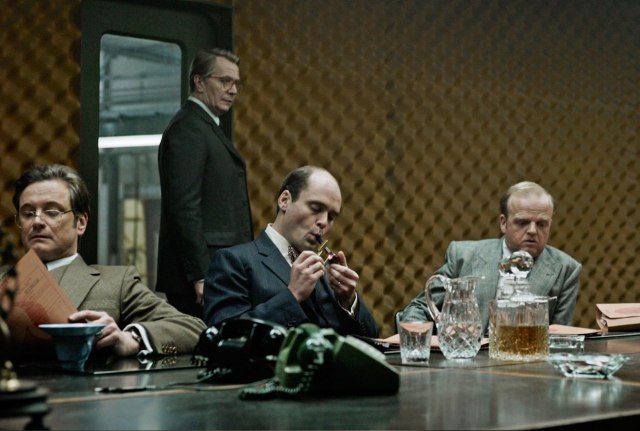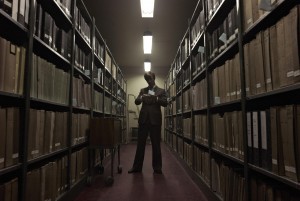Tinker Tailor Soldier Spy (2011). Directed by Tomas Alfredson. Screenplay by Bridget O’Connor and Peter Straughan. Starring Gary Oldman, Colin Firth and Tom Hardy.
Tinker Tailor Solider Spy: A George Smiley Novel
John Le Carré
Penguin, 2011 (first published 1974)
When you see Gary Oldman as George Smiley in Tomas Alfredson’s film of Tinker Tailor Soldier Spy, you may want to pinch yourself. Could this precise, subtle actor – buried deep in a middle-class British skin as thick as an elephant’s hide so that his feelings filter out only in the flickering eyes, the tiny tremors of facial muscles, the small delays in his worn stride – really be the same Gary Oldman who, in his youth, used to demolish his roles like a starving man going at a slab of steak? When did he become this elegantly minimalist performer? (Perhaps in Christopher Nolan’s Batman pictures, where his performance as the Police Commissioner Gordon, bowed down by worry, striving to remain decent in a polluted world, is one of the few authentic pleasures.)
In Tinker Tailor he leads the prize ensemble of 2011 in an extraordinarily taut, literate adaptation by Peter Straughan and the late Bridget O’Connor of the 1974 John Le Carré novel that famously generated a 1980 British miniseries starring Alec Guinness as Smiley. Oldman had his work cut out for him, taking over a role that’s still associated with Guinness and rightly considered the pearl of the last epoch of an amazing career. In the Ealing comedies of the 1950s, Guinness made comic triumphs out of characters whose glints of madness and anti-establishment impulses were salted away in the personae of unremarkable workaday types whose stick-to-it-iveness was a satirical comment on the English character. Smiley, a worker bee so unobtrusively thorough that he was born for a post at MI6, was in some odd way an evolution of those characters Guinness had played in movies like The Lavender Hill Mob and The Man in the White Suit. Oldman doesn’t have that kind of actor’s history or Guinness’s gift for making the act of listening inherently dramatic. But he does honor to his predecessor’s memory, especially in the marvelous scene where Smiley, in his cups and revealing much more than usual, relates the story of the time he encountered “Karla,” master spy of the KGB, who in the moments after being tortured by CIA operatives offered to turn Smiley into a double agent working for the Soviets. Karla argued that the eastern and western systems of espionage were no different from each other and that certainly neither occupied the moral higher ground.
Karla’s claim is the linchpin of Le Carré’s portrait of Cold War spying. In books like Tinker Tailor and The Spy Who Came in from the Cold (and many others), he supplied a glum, unappetizing image of MI6 that countered the glamorous one Ian Fleming invented in the James Bond books and Hollywood perpetuated in the early entries in the film series with Sean Connery as Bond. Most of the characters in Tinker Tailor are smug, graying desk jockeys negotiating for power and the perks that accompany it; their stinging banter barely conceals their resentment of anyone whose inferior status suggests they don’t come up to the mark and their jealousy of anyone above them whose job they assume they could do much better. These men in their expensive suits, stabbing each other quietly in the back, are Le Carré’s satirical metaphor for the decay of England after the fading of the empire, and his moral outrage at their behavior and at the system they serve is rendered with ironic understatement. But he’s a humanist, and his heroes are always men (and occasionally women) who struggle to achieve a kind of decency in a context that makes it almost, but not quite, impossible. In Tinker Tailor the Circus, as MI6 is known among its own members, passes from the directorship of a man known as Control – Karla’s counterpart – who resigns after a Budapest operation blows up in the early seventies and one of their best men is shot; Smiley’s forced retirement from his post as deputy chief is collateral damage. Later the undersecretary Lacon, who fired him, brings him back for a covert investigation of the current regime upon receiving confirmation that there’s a Soviet mole right at the top of the Circus chain and that Witchcraft, the intel-gathering network of which Control’s successor Percy Alleline is so proud, has been entirely compromised.
Le Carré is the prose poet of the Cold War, but he can be obscure. When you pick up Tinker Tailor now, you have to fight to keep the narrative strands straight, and his language, overlaid with jargon and the private language of the Circus spies, doesn’t help you out. His point is that these men deal in codes, more than one of which may operate at the same time, and the language is meant to convey an intricate game of secrets, but you have to have a lot of patience to play that game and stick with the novel. Le Carré made a lasting contribution to western literature, but it isn’t his style; it’s his vision of the era that ended abruptly when the Berlin Wall came down in 1989, and his books from before that year are soaking in its rancid juices. (Several others have been turned into movies and TV series, none better than the first: Martin Ritt’s 1965 movie of The Spy Who Came in from the Cold, with its indelible performances by Richard Burton and Claire Bloom.) Alfredson’s movie has to render as much plot as the six-hour miniseries in two hours, so you have to concentrate; if your focus lags you’re in trouble. Fortunately the movie is gripping, and what it holds you with is a combination of the intelligence of the writing, the intricacy of the spiraling story line, and the across-the-board superlative acting. O’Connor and Straughan wisely reorganize Le Carré’s narrative into mostly linear form (there are a few discrete flashbacks), beginning with the shooting of Jim Prideaux (Mark Strong) in Budapest rather than with his emergence as the latest staff member at a rural boys’ school after he’s been extracted from the Soviets. (Promoting the rumor that he was not only shot but killed is central to his reintegration into civilian life now that he’s no longer of any use to the Circus.)
The title alludes to a simple system Control (John Hurt) devised for coding the higher-ups in the Circus when he first heard about the possibility that the Soviets have succeeded in infiltrating it. (Prideaux was initially sent to Budapest to locate the Russian general who was offering the name of the mole in exchange for being allowed to defect to the west.) As well as Smiley – whose retirement has, of course, put him out of consideration as the mole – the list includes Alleline (Toby Jones), Toby Esterhase (David Dencik), Roy Bland (Ciarán Hinds) and Bill Haydon (Colin Firth), Prideaux’s close friend and the colleague with whom Smiley has had the most complicated relationship, since Haydon slept with his now-estranged wife Ann. (Ann doesn’t make an appearance in the movie, but fans of the miniseries will remember Sian Phillips, who appeared in the role in the final scene of the last episode. The series ended with her telling George, in answer to his query, that she never loved Bill and then observing, with a withering combination of perceptiveness and condescension, “Poor George. Life’s such a puzzle to you, isn’t it?”) These men occupy the “lions’ den” a floor up from the rest of the Circus; Smiley charges a “scalphunter” (a liaison for operatives in various parts of the globe) named Peter Guillam (Benedict Cumberbatch), to obtain various forms of information for him without arousing the suspicions of the lions. This assignment prompts one of the film’s tensest sequences when Guillam, asked to snag the Circus duty log for the night the report of Prideaux’s shooting came in, is suddenly called into Alleline’s office and accused of consorting with a disgraced agent named Ricki Tarr (Tom Hardy). And in fact he has been in touch with Tarr, through his assignment for Smiley and Lacon (Simon McBurney) – Tarr is the source of their intel about the mole – so he has to lie outright to his bosses. The colorful cast of characters also includes a pair of women. One is a former Circus researcher named Connie Sachs (Kathy Burke), whom Alleline “chucked out on the rubbish heap,” in her words, when her eagle eye spotted a detail in a piece of footage that suggested that Witchcraft’s trusted Russian source was a double agent running a mole (Alleline told her she was becoming “too sensitive” ~ read “paranoid”). The other is Irina (Svetlana Khodchenkova), the wife of an abusive Russian agent who becomes first Tarr’s lover and then his source.
Almost everyone in the large, gifted cast gets at least one terrific moment. It would be tough to pick a favorite, but Burke’s scene is a highlight (and the one-scene role of the fond, disenchanted, alcoholic researcher Connie is an actor’s dream). As Tarr in the TV version, Hywel Bennett had a tainted boyishness; Tom Hardy gives him a mix of professional seriousness and playboy recklessness. The catch in the character is right there in the writing – the sad fate of Irina, who winds up the victim of her own love for Ricki, brings out an emotional depth in him that even he didn’t know he was capable of. (This is Hardy’s heartbreaking moment.) Cumberbatch, a chameleon actor who has recently been delighting PBS viewers by playing a contemporary version of Sherlock Holmes as a kind of hipster savant, has a poignant scene here where Guillam, instructed by Smiley to sacrifice any entanglements in his private life that could make him vulnerable, has to break up with his boyfriend without providing an explanation. This just a sampling; the movie offers many more scenes that remind us of the virtues of English acting technique. It’s worth nothing that as Jim Prideaux, Mark Strong, known to American audiences mostly as an effective melodramatic villain, demonstrates that he belongs in this august company. (Ian Bannen, who played Prideaux superbly on TV, was no better.)
Alfredson’s last film was the Swedish vampire movie Let the Right One In, which was impressive in its rather clinical way, but wouldn’t have led one to expect he could turn out a movie of the caliber of Tinker Tailor Soldier Spy. Beginning with Oldman’s command of the role of George Smiley, the movie is an unbroken series of pleasant surprises for fans of fine acting. And like the Christmas season’s other first-rate thriller, David Fincher’s The Girl with the Dragon Tattoo, it operates on the highest principle: an unstinting respect for the intelligence of the audience.
Steve Vineberg is Distinguished Professor of the Arts and Humanities at College of the Holy Cross in Worcester, Massachusetts, where he teaches theatre and film. He also writes for The Threepenny Review, The Boston Phoenix and The Christian Century and is the author of three books: Method Actors: Three Generations of an American Acting Style; No Surprises, Please: Movies in the Reagan Decade; and High Comedy in American Movies.
This post may contain affiliate links.











